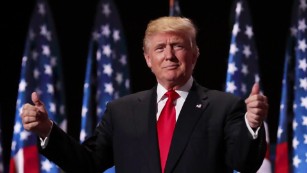Source: Trump immigration plan mirrors post-9/11 policy
At rallies in the last weeks of his presidential campaign, Donald Trump told his supporters "my plan ends illegal immigration and suspends immigration from terror problem regions" and that "we will stop illegal immigration, deport all criminal aliens... and it will happen within the first week of my presidency."
It may not be happening that quickly, but it looks like Trump's tough immigration policy is starting to take shape.
Trump's team is working on plans for a program that would track immigrants traveling to the US from high-risk countries, a source familiar with the process told CNN.
The source says it will be similar to a program initiated after 9/11, called the called the NSEERS program (National Security Entry-Exit program), which folded five years ago. It did not suspend immigration from those countries, but rather required an additional layer of screening for people coming from countries inhabited by known terrorists, like Iraq, Syria and Afghanistan—all Muslim-majority nations. The screening included extensive interviews, fingerprinting, and for some, monthly checks.
The program being mentioned now was blasted by civil rights activists, and the ACLU told CNN in an interview this week that NSEERS "actually made genuine efforts at trying to combat terrorism more difficult by destroying relationships with immigrant communities and actually negatively impacting the ability of the federal government to cooperate with foreign governments in fighting terrorism."
The program also ignores data, compiled by groups like The New America Foundation, which shows most domestic terror attacks are carried out by US-born or naturalized citizens.
A DHS inspector generals' report in 2012 called the program "obsolete," "unreliable" and an "inefficient use of resources."

Trump on amnesty for some undocumented immigrants
A Muslim ban
A registry for people from these countries is the latest iteration of a Trump proposal that began with a shocking call in December 2015 when he said he wanted "a total and complete shutdown of Muslims entering the United States until our country's representatives can figure out what is going on."
That bold claim has become more muddled over time after Trump came under fire for nakedly targeting an entire religion.
As for Trump's developing policy, the source did not specify how many or which countries would considered high-risk but said "it's a moving target" given the ISIS threat. Not all countries with large Muslim populations are part of the current list, according to this source, who added that a complete ban of immigrants from high-risk countries is "something we're prepared for, but it's unlikely ... all options are on the table."
Last year, in response to a reporter's question, Trump said he would "certainly implement" a database on all Muslims living in the US. When pressed by other reporters, Trump later said he was in favor of a database tracking Syrian refugees in the US, though he never ruled out a broader Muslim ban.
The Trump transition team denied Thursday that he ever advocated for a registry.
"President-elect Trump has never advocated for any registry or system that tracks individuals based on their religion, and to imply otherwise is completely false," spokesman Jason Miller said. "The national registry of foreign visitors from countries with high terrorism activity that was in place during the Bush and Obama administrations gave intelligence and law enforcement communities additional tools to keep our country safe, but the President-elect plans on releasing his own vetting policies after he is sworn in."
AG candidate architect of program
One of the architects of the NSEERS program helped Trump's campaign form immigration policy, and is reportedly being considered for attorney general, according to some news reports. Kris Kobach, the current secretary of state of Kansas, is a lightning rod for critics who have accused him of extreme racism and having ties to white nationalists. His involvement with the transition team is causing a ripple of alarm among civil rights and immigration activists.
Kobach told CNN he was part of the transition assisting with immigration, however a Trump spokesman said Thursday he is not officially an adviser. It is unclear if that changed after media reports on the new immigration plan were reported.
Related: Who could be in Trump's cabinet?
Kobach is almost single-handedly responsible for some of the nation's strictest immigration laws in at least a half-dozen states—he not only writes the laws, but advocates for them and battles on their behalf in court. He is often cited as the chief architect of what Arizona's SB 1070, which was passed in 2010 and led to protests and state boycotts for encouraging the profiling of Latinos and other minorities.
The Arizona law requires police to determine a person's immigration status when there is "reasonable suspicion" that they are not legally in the US; it was partially upheld by the Supreme Court, but had other sections struck down by the court in 2011.
Modeling a new program off the NSEERS program could be more legally sound for Kobach and Trump since courts never ended it.
The Arizona law, which critics call the "show me your papers" law, was fought by the ACLU and numerous other civil rights organizations, because it "invites rampant racial profiling" against Latinos, Asian-Americans and others based only on how they look or sound.
Kobach was also behind a change in voter registration in his home state of Kansas, requiring voters to show passports or birth certificates to register to vote, although that law has suffered setbacks in court.
Kobach has also spearheaded and pushed through restrictive voter laws for immigrants in at least six states, including Arizona, Alabama, Georgia, Missouri and Kentucky; he has often himself been the attorney in court representing the states trying to push the new laws. Kobach has worked with groups including the Federation for American Immigration Reform that have pushed for tough measures on undocumented immigrants. The Southern Poverty Law Center has listed FAIR as a hate group since 2007.
While voter fraud by immigrants has been proven to rarely occur, Kobach has said it is a real problem and the reason harsher measures are needed.
"Unfortunately, it rarely gets prosecuted," Kobach said in an February 2015 interview. "This is not a victimless crime. Every time an alien, legal or illegal, participated in an election. That effectively cancels out the vote of the US citizen, effectively disenfranchises that US citizen. And we have many cases in Kansas of aliens getting on our voter rolls and voting. Sometimes and just not realizing they are breaking the law. Sometimes it is part of the coordinated effort."
The ACLU has been involved in many of the lawsuits opposing Kobach in various states.
"The history of his policies is a history of utter failure -- failure in the courts, and failure on the ground," said Omar Jadwat, a staff attorney at the ACLU Immigrants' Rights Project, speaking to CNN on Wednesday.
"The notion that he pushed around the country that state and local police have inherent authority to work as immigration agents, his proof of citizenship requirement that he imposed on US citizen voters in Kansas, the local laws that he pushed, the anti-DREAMer lawsuits that he attempted. If you look at those policies, and you think about what has been the fate of those policies in the courts, they have all failed miserably to stand up to legal scrutiny and have been found either unconstitutional or illegal on other grounds or both," said Jadwat.
In an interview earlier this week, Kobach told CNN that he believes that the US shouldn't wait for undocumented immigrants to be convicted of a crime before deportation, citing a lack of resources to prosecute every crime. "This guy's is a known gang member. He's gotten arrested multiple times. Sure, they haven't convicted him yet, but we ought to get him out of the country and that is what this administration, the Trump administration, will probably do and what the Obama administration has not been doing," he told CNN's Brianna Keilar.
Kobach is also known for his views that numerous undocumented immigrants will leave the US, or "self-deport," if more restrictive immigration laws are enacted, and more undocumented immigrants are detained. But in the absence of self-deportation, Kobach has strongly upheld the idea of mass deportations when undocumented immigrants are found.
He has been labeled a racist by the Southern Poverty Law Center and also the ACLU. In an online publication, the SPLC writes:
"Given Kobach's racially charged main efforts of recent years -- working to restrict voting rights and curtail immigration -- his relationship with racist groups isn't too difficult to understand. Maybe it's time to question Kobach's claims that he is simply pursuing these issues to enforce the law. His strange bedfellows in the white nationalist movement would certainly agree that fewer immigrants and stricter voting procedures are a good thing, because, well, that would stop brown and black people from being empowered."
Kobach is a strong proponent for a wall along the US-Mexico border and other measures to stop undocumented immigrants from entering the US, and at the Republican convention this summer, he successfully petitioned to have language in the official platform call for a wall on the southern border, in line with Trump's campaign slogan.
Though he is hardly known outside of immigration and conservative circles, Kobach is cited even by critics as one of the best thinkers and intellects among his peers. He is not only Ivy-league educated, but also has an elite international pedigree, with degrees from Harvard, Oxford and Yale Law School.
An adviser to Mitt Romney during his run for President, Kobach was chair of the Kansas Republican Party from 2007-2009, and was elected secretary of state there in 2010.
News Courtesy:cnn.com











